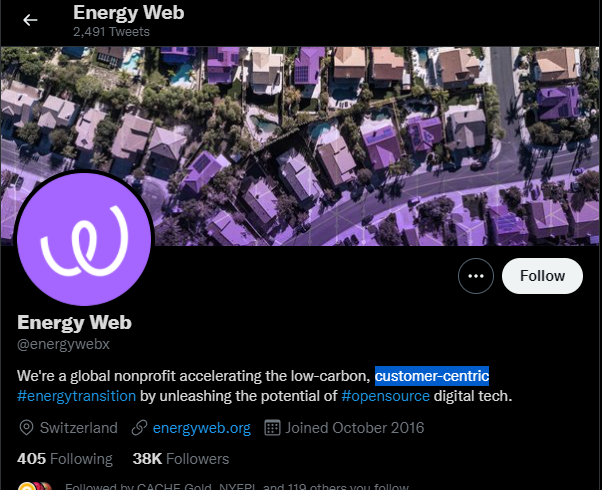Energy Web Investor
Investing In Energy Web Token (EWT) – Everything You Need to Know

Securities.io maintains rigorous editorial standards and may receive compensation from reviewed links. We are not a registered investment adviser and this is not investment advice. Please view our affiliate disclosure.
Table Of Contents
The Energy Web Token (EWT) project is a decentralized open-source blockchain network designed to empower energy sector Dapp developers. The platform seeks to accomplish this task through the creation of a digital infrastructure that connects grid operators, customers, and physical assets such as electric vehicles, solar panels, and thermostats in new ways. As such, there has been a lot of attention surrounding the project.
What Problems Does EWT Attempt to Fix?
The Energy Web Token (EWT) platform was built out of a desire to rethink energy conservation efforts. Currently, most energy upgrades are accomplished via major upgrades to the physical infrastructure. Sadly, this strategy is expensive and cumbersome. Also, it completely ignores the fact that interconnectivity would provide more benefit than separate improvements.
The Energy Web Token platform utilizes sensors and software to enhance electrical power usage and provide new opportunities in the market. The system empowers anyone to offer any power asset to a global community of users via an open and censorship-resistant market.

Energy Web Token (EWT) – Twitter
Energy Waste
The current independent nature of the world's energy infrastructure is inefficient in many ways. Excess energy is wasted rather than shared or sold to others. The Energy Web Token platform makes it possible to track, capture, and redistribute this energy where it's needed most. This strategy helps users share their energy assets and improve the world's carbon footprint.
Lack of Transparency
The average energy company user has no access to vital information such as the overall energy wasted on the network. They are not privy to any sensitive company data such as the specifics of the hardware or other vital data that may make an energy provider look bad. This lack of transparency often leads to abuse and price gauging as these firms are notorious for taking advantage of customers. The Energy Web Token introduces traceable logs with access to near-real-time data to improve the user experience and level the playing field.
Benefits of Energy Web Token (EWT)
The Energy Web Token (EWT) is a customer-centric, open-source, blockchain. The platform borrows many technical aspects from Ethereum to simplify Dapp developer onboarding. As such, the network is secure, reliable, and fully EVM-compatible.
Passive Rewards
Users can secure passive rewards by sharing their energy assets with the network or by providing other services. The incentivization strategy of the platform upends the traditional centralized business model in place today and replaces it with a more democratic and inclusive option. By connecting these islands of energy creation, regular users can now get in on the trillion-dollar energy service markets.
Growing Network
The Energy Web Token (EWT) is comprised of a global community of more than 100 energy market participants. These firms span the gauntlet from service providers to renewable energy markets and distributed energy resources. The Energy Web Token continues to find new partners that share in their vision of a more sustainable market.
How Does Energy Web Token (EWT) Work
The EWT project relies on a shared infrastructure, an incentive scheme, and a traceable log of information to secure rewards for users offering assets. Here are some of the core features that make the Energy Web Token unique.

Energy Web Token (EWT) – Partners
Energy Web Chain
The Energy Web Chain operates as the first open-source, enterprise blockchain platform tailored to the energy sector. This blockchain integrates a scalable consensus mechanism to achieve high transaction throughput and vertical scalability. The project improves sustainability and functionality when compared to second and third-generation blockchains. Additionally, the Energy Web Chain is smart contract programmable and the community invites Dapp developers to create their own applications to improve the user experience.
Oracles
The network's blockchain relies heavily on off-chain sensors called Oracles. These sensors provide real-world data to EW applications, bridges, and third-party Dapps. Oracles have the ability to communicate this information to-and-from the network. They can also trigger smart contracts. In the Energy Web Token ecosystem, oracles are used to monitor the price of energy assets, asset usage, and waste.

EW-DOS Tools
Energy Web Decentralized Operating System
As part of the founder's strategy to provide a developer-friendly platform to the market, the network introduces a stack of technologies known as the Energy Web Decentralized Operating System. This system simplifies connecting participants within the energy market to increase grid flexibility. Developers also gain access to powerful front-end applications and a variety of software development toolkits to promote and provide clean energy and carbon emissions traceability.
Consensus
The Energy Web Chain utilizes the Proof of Authority (PoA) consensus mechanism to validate the state of the network. Notably, this system is a Proof-of-Work variant with the main difference being that only approved nodes can validate transactions. These nodes are known as Validators. To become a validator you must be a legally registered organization and be an active member of the Energy Web Foundation. For their efforts, Validators get paid rewards in the network's native utility token, EWT.
EWT
The EWT Utility token serves a variety of roles throughout the Energy Web Token network. Users can pay for services using the token. Developers can also use the token to create more responsive and streamlined applications. Notably, EWT's primary purpose is to provide a way to universally track the value of energy assets across the global blockchain.
Identification Services
EWT provides a host of identification services to the market. The platform enables users to access multiple energy assets using a blockchain verifiable ID rather than providing their personal information directly. This approach is preferred by most due to the rising number of data thefts that occurred over the last 5 years. These thefts have left millions of customers' personal information in the hands of nefarious individuals. Removing your personal data from the ID verification process is the best way to eliminate these issues.
How to Buy Energy Web Token (EWT)
Energy Web Token (EWT) is available on the following exchanges:
Uphold – This is one of the top exchanges for United States residents that offers a wide range of cryptocurrencies. Germany & Netherlands are prohibited.
Kraken – Founded in 2011, Kraken is one of the most trusted names in the industry with over 9,000,000 users, and over $207 billion in quarterly trading volume.
The Kraken exchange offers trading access to over 190 countries including Australia, Canada, Europe, and is a top exchange for USA residents. (Excluding New York & Washington state).
Uphold Disclaimer: Terms Apply. Cryptoassets are highly volatile. Your capital is at risk. Don’t invest unless you’re prepared to lose all the money you invest. This is a high-risk investment, and you should not expect to be protected if something goes wrong..
The Energy Web Token (EWT) – A Green Blockchain Project
The Energy Web Token represents the growing sector of the market primarily focused on sustainability. This year has seen power-hungry crypto, such as Bitcoin, take heat for excessive energy consumption. The Energy Web Token provides a sustainable network that enables regular users to earn profits and keep track of their usage more diligently. As the price of energy continues to rise, you can expect to see this project continue to gain momentum moving forward.
David Hamilton is a full-time journalist and a long-time bitcoinist. He specializes in writing articles on the blockchain. His articles have been published in multiple bitcoin publications including Bitcoinlightning.com
You may like


Buy Energy Web Token | Buy EWT in 4 Steps (July 2025)


Investing In Render Token (RENDER) – Everything You Need to Know


Investing in Hedera Hashgraph (HBAR) – Everything You Need to Know


Investing In Helium (HNT) – Everything You Need to Know


Investing In Solana (SOL) – Everything You Need to Know


Investing In Avalanche (AVAX) – Everything You Need to Know